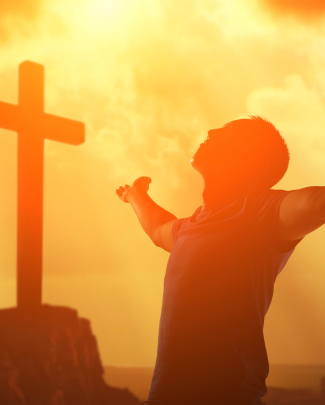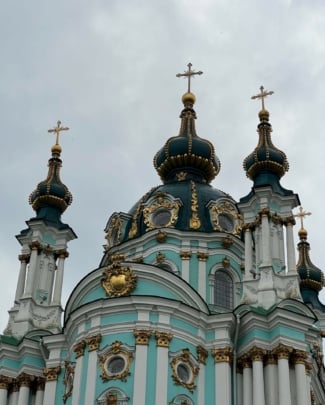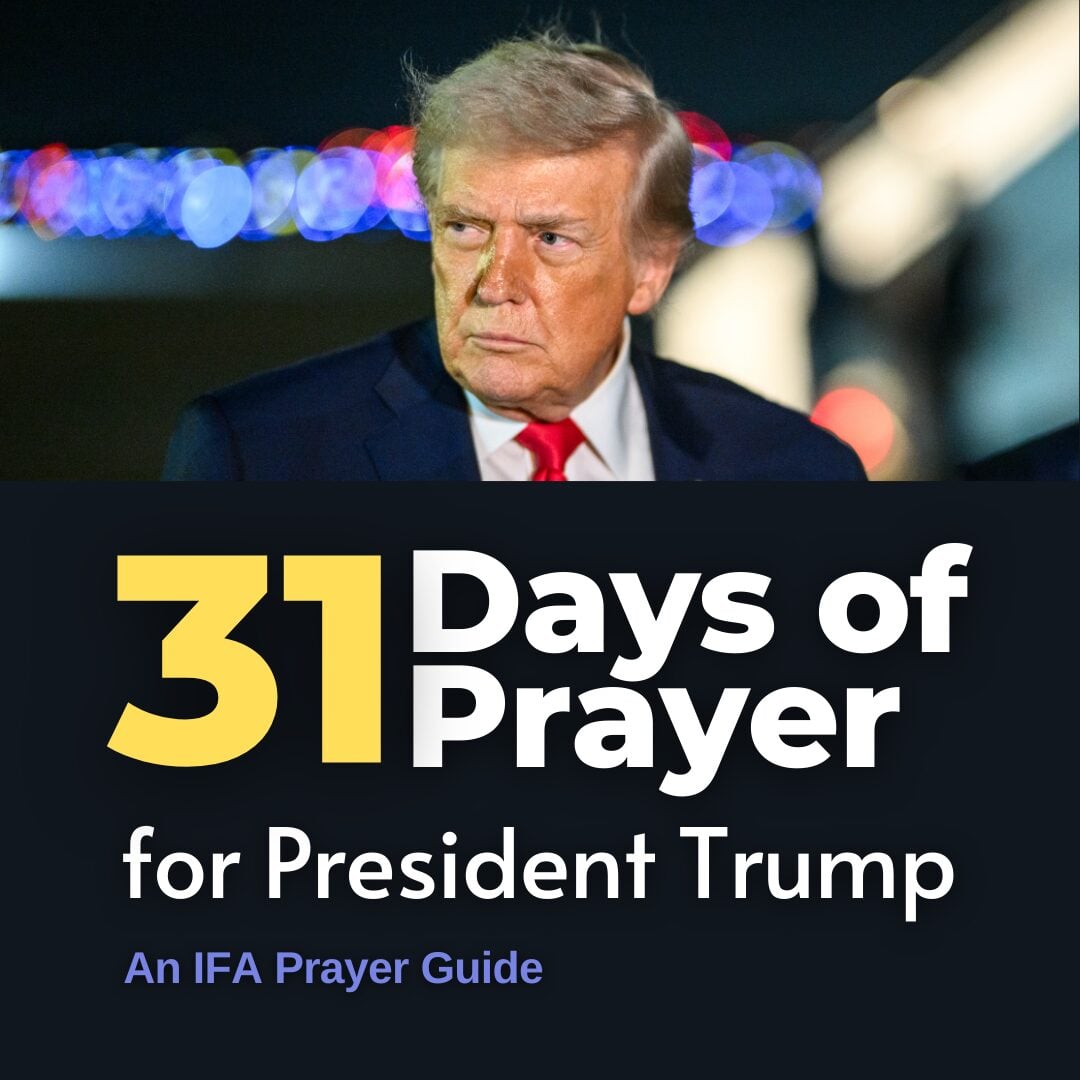The True Story of Thanksgiving
Pilgrims Past, Future… and Present
Suicidal Thoughts Rising in Youth
Moms for Liberty-Backed School Board Members Take Action
Be Bold in the Face of Persecution!
The True Story of Thanksgiving
IFA Founder Derek Prince explains the true story of the Pilgrims, the first Thanksgiving, and the importance of fasting–all of which can speak to us today.
Having been educated in Britain, I do not recall ever having learned anything at school about the Pilgrims. The phrase, “Pilgrim Fathers,” commonly used by Americans, had created in my mind a vague impression of severe old men with long white beards, probably attired in dark formal clothing like that associated with ministers of religion. I was surprised to discover that the majority of the Pilgrims at the time of their arrival in America were still young men and women. For example, William Bradford was thirty-one years old in 1621, when he was first appointed governor of the colony. Most of the other Pilgrims were of about the same age or younger. As portrayed in wax in the historical tableau on board the replica of the Mayflower in Plymouth harbor, Bradford and his companions reminded me not a little of the Jesus People who emerged on this continent in the 1960’s.
Do you want state prayer alerts?
As I studied Bradford’s own firsthand account of the founding of Plymouth Colony and of its early struggles, I developed a strong sense of spiritual kinship with him and his fellow Pilgrims. I discovered that their whole way of life was based upon the systematic study and application of the Scriptures. With the main conclusions and convictions to which this study led them, I found myself in complete accord.
Having obtained my own degrees in the University of Cambridge and having held a fellowship at King’s College, Cambridge, I was particularly interested to see how many of the Pilgrims’ spiritual leaders had received their education at Cambridge. Three of those most closely associated with the Pilgrims’ story were Richard Clyfton, John Robinson, and William Brewster. Clyfton was the elder of the original congregation at Scrooby, in England. Robinson was the elder of the Pilgrims’ congregation at Leyden, in Holland. Brewster was the elder who actually traveled over on the Mayflower and became the chief spiritual leader of the original colony in Plymouth. All three of these men received their education at Cambridge.
During the months that followed my visit to Plymouth, I traveled widely and conducted meetings in various parts of the United States. I began to share with those I met some of my stimulating discoveries from Bradford’s book, Of Plymouth Plantation. To my surprise, I encountered almost complete and universal ignorance of the whole subject. Many people of at least average education, born and raised in the United States, confessed that they had never heard of the book. A few acknowledged that they had heard of the book, but none, as I recall, had read it.
For this reason, I feel that I need offer no apology from quoting from Bradford’s book various passages that relate to the theme of our present study. All the quotations that follow are taken from the edition published by Modern Library Books, with an introduction and notes by Samuel E. Morrison.
The whole course of Bradford’s life was determined by spiritual experiences of his boyhood and early manhood. In Morison’s introduction to his edition of Bradford’s book, these early experiences are briefly described as follows:
“William Bradford was born at Austerfield, Yorkshire, in the early spring of 1590….At the age of twelve he became a constant reader of the Bible-the Geneva version that he generally quotes-and when still a lad he was so moved by the Word as to join a group of Puritans who met for prayer and discussion at the house of William Brewster in the nearby village of Scrooby. When this group, inspired by the Rev. Richard Clyfton, organized itself as a separate Congregational Church in 1606, Bradford joined it despite ‘the wrath of his uncles’ and the ‘scoff of his neighbors.’ From that date until his death half a century later, Bradford’s life revolved around that of his church or congregation, first in Scrooby, next in the Low Countries and finally in New England.”
Although the Pilgrims were initially associated with the Puritans, there were important differences between them. Both saw the need of religious reform, but they differed concerning the means by which reform was to be achieved. The Puritans determined to remain within the established church and to impose reform from within-by compulsion, if necessary. The Pilgrims sought liberty for themselves, but declined to use the machinery of secular government to enforce their views upon others. These differing points of view are expressed in the following passage from Leonard Bacon’s “Genesis of the New England Churches:”
“In the Old World on the other side of the ocean, the Puritan was a Nationalist, believing that a Christian nation is a Christian church, and demanding that the Church of England should be thoroughly reformed; while the Pilgrim was a Separatist, not only from the Anglican Prayer Book and Queen Elizabeth’s episcopacy, but from all national churches.”
“The Pilgrim wanted liberty for himself and his wife and little ones, and for his brethren, to walk with God in a Christian life as the rules and motives of such a life were revealed to him from God’s Word. For that he went into exile; for that he crossed the ocean; for that he made his home in a wilderness. The Puritan’s idea was not liberty, but right government in church and state-such government as should not only permit him, but also compel other men to walk in the right way.”
The difference between Puritans and Pilgrims could be expressed in the two words reformation and restoration. The Puritans sought to reform the church as it existed in their day. The Pilgrims believed that the ultimate purpose of God was to restore the Church to its original condition, as portrayed in the New Testament. This shines forth very clearly in the first paragraph of the first chapter of Bradford’s book, where he expresses the Pilgrims’ vision of restoration in the following words: “the churches of God revert to their ancient purity and recover their primitive [i.e. original] order, liberty, and beauty.”
Later in this chapter, Bradford returns to this theme when he declares the Pilgrims’ purpose: “[They labored] to have the right worship of God and discipline of Christ established in the church, according to the simplicity of the Gospel, without the mixture of men’s inventions; and to have and be ruled by the laws of God’s Word, dispensed in those offices, and by those officers of Pastors, Teachers, and Elders, etc.; according to the Scriptures.”
With this purpose in view, the original believers in Nottinghamshire, Lincolnshire, and Yorkshire: “joined themselves [by a covenant] into a church estate, in the fellowship of the Gospel, to walk in all His ways made known, or to be made known unto them, according to their best endeavors, whatsoever it should cost them, the Lord assisting them.”
Later when the congregation moved to Leyden, in Holland, Bradford described their way of life there: “they came as near the primitive [original] pattern of the first churches as any other church[es] of these later times have done.”
Again in his fourth chapter, Bradford describes the main motive of the Pilgrims in undertaking their journey to America: “Lastly [and which was not least], a great hope and inward zeal they had of laying some good foundation… for the propagating and advancing of the Gospel of the kingdom of Christ in those remote parts of the world; yea, though they should be even as stepping stones unto others for the performing of so great a work.”
One distinctive practice employed by the Pilgrims to achieve their spiritual goals was that of united public prayer and fasting. There are various references to this in Bradford’s book. One of the most poignant passages describes the Pilgrims’ preparation for their departure from Leyden:
“So being ready to depart, they had a day of solemn humiliation, their pastor [John Robinson] taking his text from Ezra 8:21: ‘And there at the river, by Ahava, I proclaimed a fast, that we might humble ourselves before our God, and seek of him a right way for us, and for our children, and for all our substance.’ Upon which he [Robinson] spent a good part of the day very profitably and suitable to their present occasion; the rest of the time was spent in pouring out prayers to the Lord with great fervency, mixed with abundance of tears.”
Bradford’s use of the word humiliation in dictates that the Pilgrims understood the scriptural connection (explained in chapters 6 through 8 of my book Shaping History Through Prayer and Fasting) between fasting and self-humbling. Robinson’s choice of the text from Ezra is singularly appropriate. Both in motivation and in experience, there is a close parallel between the Pilgrims’ embarking on their journey to the New World and Ezra’s company of exiles returning from Babylon to Jerusalem to help in the restoration of the temple. The end of Robinson’s address is given by Edward Winslow in Verna M. Hall’s “Christian History of the Constitution:”
“We are now ere long to part asunder, and the Lord knoweth whether he [Robinson] should live to see our face again. But whether the Lord had appointed it or not, he charged us before God and His blessed angels, to follow him no further than he followed Christ; and if God should reveal anything to us by any other instrument of His, to be as ready to receive it, as ever we were to receive any truth by his ministry; for he was very confident the Lord had more truth and light yet to break forth out of His holy Word. He took occasion also miserably to bewail the state and condition of the Reformed churches who were come to a period [standstill] in religion, and would go no further than the instruments of their reformation [i.e. those who had been leaders in the Reformation].”
“As for example, the Lutherans, they could not be drawn to go beyond what Luther saw; for whatever part of God’s will He had further imparted and revealed to Calvin, they [the Lutherans] will rather die than embrace it. And so also, saith he, you see the Calvinists, they stick where he [Calvin] left them, a misery much to be lamented; for though they were precious shining lights in their times, yet God had not revealed His whole to them; and were they now living, saith he, they would be as ready and willing to embrace further light, as that they had received.”
“Here also he put us in mind of our church covenant, at least that part of it whereby we promise and covenant with God and one another to receive whatsoever light or truth shall be made known to us from His written Word; but withal [be] exhorted us to take heed what we received for truth, and well to examine and compare it and weigh it with other Scriptures of truth before we received it. For saith be, it is not possible [that] the Christian world should come so lately [recently] out of such thick anti-Christian darkness, and that full perfection of knowledge should break forth at once.”
John Robinson’ message on this occasion sums up the essence of the Pilgrims’ theological position. This is indicated by their very choice of the name Pilgrims. They did not claim to have arrived at a final understanding of all truth. They were on a pilgrimage, looking for the further revelation of truth that lay ahead as they walked in obedience to truth already received.
Bradford himself believed firmly that he and his companions were in the same line of spiritual pilgrimage as the saints of the Old and New Testaments, and he habitually resorted to the language of the Bible to express his feelings and reactions. He describes the arrival of the Mayflower at Cape Cod, and the many dangers and hardships which the Pilgrims encountered. He concludes the chapter with this:
“What could now sustain them but the Spirit of God and His grace? May not the children of these fathers rightly say: ‘Our fathers were Englishmen which came over this great ocean, and were ready to perish in this wilderness; but they cried unto the Lord, and He heard their voice and looked on their adversity.’” [This is Bradford’s own paraphrase of Deuteronomy 26:5,7.]
“Let them therefore praise the Lord, because He is good; and his mercies endure forever. Yea, let them which have been redeemed of the Lord, shew how He hath delivered them from the hand of the oppressor. When they wandered in the desert wilderness out of the way, and found no city to dwell in, both hungry and thirsty, their soul was overwhelmed in them. Let them confess before the Lord His lovingkindness and His wonderful works before the sons of men.’” [This is Bradford’s version of Psalm 107:1-5,8.]
It is not possible to quote the many instances of answered prayer that Bradford records, but there is one further instance of a public fast that must be mentioned. In the summer of 1623, the corn crop which the Pilgrims had so carefully planted was threatened: ”by a great drought which continued from the third week in May, till about the middle of July, without any rain and with great heat for the most part, in so much as the corn began to wither away….it began to languish sore, and some of the drier grounds were parched like withered hay…Upon which they set apart a solemn day of humiliation [fasting] to seek the Lord by humble and fervent prayer….And He was pleased to give them a gracious and speedy answer, both to their own and the Indians’ admiration [i.e. amazement]…For all the morning, and greatest part of the day, it was clear weather and very hot, and not a cloud or any sign of rain to be seen; yet toward evening it began to overcast, and shortly after to rain with such sweet and gentle showers as gave them cause of rejoicing and blessing God…”
Normally, if rain had fallen at all in such conditions, it would have been in the form of a thunderstorm, which would have beaten down the corn and destroyed the last hope of a harvest. But on this occasion, Bradford goes on to relate:
“It came without either wind or thunder or any violence, and by degrees in that abundance as that the earth was thoroughly…soaked therewith. Which did so apparently revive and quicken the decayed corn and other fruits; as was wonderful to see, and made the Indians astonished to behold. And afterwards the Lord sent them such seasonable showers, with interchange of fair warm weather as, through His blessing, caused a fruitful and liberal harvest…For which mercy, in time convenient, they also set apart a day of thanksgiving.”
This practice of setting aside special days of prayer and fasting became an accepted part of the life of Plymouth Colony. On November 15, 1636, a law was passed allowing the governor, and his assistants “to command solemn days of humiliation by fasting, etc. and also for thanksgiving as occasion shall be offered.”
If we examine the promises given in Isaiah to those who practice the kind of fasting approved by God, we see that these come to their climax in this verse: “And they that be of thee shall build the old waste places: thou shalt raise up the foundations of many generations; and thou shalt be called, the repairer of the breach, the restorer of paths to dwell in.” (Isaiah 58:12)
History has demonstrated that the results of fasting promised in this verse were achieved by the Pilgrims. Both spiritually and politically, they “raised up the foundations of many generations.” More than three-and-a-half centuries later, the people of the United States are still building on the foundations which the Pilgrims laid.
What do you think of the pilgrims? Share your thoughts and prayers below.
Originally published in an IFA newsletter on October 4, 1997. Author Derek Prince (1915-2003) was an internationally known Bible teacher and a “founding father” of IFA. Born in India of British parents, he became an American citizen primarily due to his unwavering belief that our biblical heritage made America the strongest hope to ignite a revival for the restoration of godly government and a restoration of biblical standards before the return of Jesus Christ, Lord of the Church. His best-known book among intercessors, Shaping History through Prayer and Fasting, portrayed his belief in prayer and fasting to receive God’s highest blessings, both for individuals and for our nation. Photo Credit: Canva.
Partner with Us
Intercessors for America is the trusted resource for millions of people across the United States committed to praying for our nation. If you have benefited from IFA's resources and community, please consider joining us as a monthly support partner. As a 501(c)3 organization, it's through your support that all this possible.


We use cookies to ensure that we give you the best experience on our website. If you continue to use this site we will assume that you are happy with it. Privacy Policy





Comments
Just a thank you for this story/teaching/information …….much appreciated ……will be taking all this in with sincere consideration.
I have in times past done precisely what the Pilgrims did …..but, now that I’m older, not so much …..perhaps I should ‘pay more attention’ to this principle…..make it lifelong. “IF MY people would only seek MY face saith our Creator …..and turn from ungodly ways …..”I will hear them …..and will not turn a blind eye …..and I can heal the land AND I WILL!” …..IF ONLY, they would humble themselves ……and then get up and walk in MY ways (The ways of MY Son) …..and fight/be devoted to the spiritual battle …..then watch ME at work by MY Spirit …..MY wonders to perform. Ignorance is not ‘bliss’.
(I’m a descendant of Wm Bradford, but did not know some of this information) I pray that the Christians in the USA can return to the practice of frequent fasting. Lord, have mercy on our nation and open our eyes. Help us to truly humble ourselves; we quote II Chron. 7:14. but don’t truly humble ourselves.
As a descendant of one who came on the Mayflower I enjoyed your article. Thanks for pointing to the brave men and women who founded our great nation.
God divinely directed the pilgrims & protected them & provided for them when they sought him. I am thankful for the pilgrims & their example to us. God bless them. Happy Thanksgiving!
I am very glad Derek Prince’s article was reprinted. We need to reminded of our Pilgrim heritage. While being a Puritan reformer can produce good works, being a Pilgrim believer produces better more lasting works, even though the Pilgrim’s efforts may be forgotten and misunderstood. Isn’t interesting, and yet so consistent with how God works, that a man from England would come here and help us remember our forgotten Pilgrim (separatist) heritage?
A most excellent word from Derek Prince. We moderns sometimes act as if our present understanding is at the pinnacle of New Testament experience and understanding, yet in the distant past there were giants in the land who walked with God in perhaps a greater level of intimacy and understanding tin areas that we largely lack. We need to be in earnest prayer that asks for the old pathways to be restored that we have cast aside.
I met Derek Prince some years ago during the Jesus People movement. I can say without a doubt: the Lord Jesus poured out the Holy Spirit on this land in a way I had never seen before nor since. We were indeed much like the first century Church. I ask you Jesus, “will you pour out the Holy Spirit on Your people once again”? We are hungry and thirsty and longing for You. There is no one like You -Only You alone can satisfy! Praise you God for Your Goodness, Mercy, and Power that never ends. Thank you Dear God for Derek and IFA. Amen to You Jesus Christ Lord of All!
I believe Jesus is about to do His Mighty work here in this dark place called America once again. Purify hearts – Change minds – By the Power of Your Holy Spirit oh God! Come soon Lord Jesus, come soon!
Thank you for sharing this truth about our early forefathers and the trials they had to endure here to found a free nation under God’s rule. The lie of today’s historians is how wicked the Pilgrim’s were to the indigenous people of that time.
I am so encouraged by this writing of Derek Prince that makes me want to purchase the book “Of Plymouth Plantation” and read first hand accounts of the founding of this great nation.
There has been a great foundation laid by the early Pilgrims through their lifestyle of prayer and fasting . God is stirring once again His people of this generation to take up this cause once again to be ones to help “rebuild the ancient ruins, raise up the ancient foundations, be the repairers of the breach, and to restore the paths in which to dwell”. America needs the Ekklesia to take her stand on the walls and pray and give the Lord no rest until America has fulfilled her destiny according to the Lord’s purposes and plans for her.
Brothers and Sisters please share these every time you read them. We need to spread God’s word!!!
I prayed
Thanks for sharing.
This nations foundation is clearly based on Judau-Christian values and religious freedom. The pilgrim’s faith sustained them in their desperate times. As a nation we must return back to our roots and not let humanism govern our nation.
Thanks again
Once again so grateful for this history lesson. Again evidence of the synergy of the ages!!
Not sure, if I would support IFA’s stances.
Thanks for sharing. There is a group who try to take away this blessed day with false accusations, claiming the pilgrims slaughtered their companions at this feast.